Aging and maceration in perfumery are two key terms in the fragrance industry, and understanding them is essential when choosing the right products for your brand.
At Jasmine, we make it a point to educate our clients on the finer details of this craft. In today’s article, we’ll explore these two concepts, highlight the Aging vs. Maceration in Perfumes, and explain when maceration is the right choice and when aging is the way to go. Stay with us.
What Is Perfume Aging?
Perfume aging is a natural chemical process that occurs spontaneously after production. During this stage, the aromatic molecules interact with the alcohol, resulting in a complete fusion of the scent components. The sharp alcoholic edge gradually softens, giving way to a fragrance that is deeper, smoother, and more enduring.
Is Perfume Aging Necessary?
While aging is not essential for every fragrance, it plays a significant role in enhancing both the scent and its longevity. So, why is it important?
Achieving Chemical Harmony
Once essential oils are blended with alcohol, the molecules need time to interact and merge seamlessly. Aging allows this process to fully develop, preventing the fragrance from breaking apart.
Softening the Alcoholic Edge
Freshly produced perfumes often carry a sharp alcoholic note that overshadows their core accords. Through aging, excess alcohol evaporates, allowing the true character of the fragrance to shine.
Enhancing Depth and Longevity
This is particularly crucial for perfumes containing natural oils or heavier materials such as woods and resins. Aging enriches the fragrance, adding greater depth and complexity, while improving its staying power on the skin.
Refining the Olfactory Profile
Aging helps clarify and balance the individual notes, making the overall composition more distinct. Over time, each accord emerges more clearly, elevating the fragrance’s quality and value.
Extending the Perfume’s Shelf Life
By stabilizing the fragrance molecules, aging strengthens their resistance to degradation. As a result, a well-aged perfume retains its aroma, structure, and quality for a longer period.
The Duration of Perfume Aging
The length of the aging process varies greatly depending on the type and concentration of the fragrance. Here are the key differences:
- Light and Fresh Fragrances: Scents such as citrus or floral perfumes don’t require much time. Two to four weeks are usually enough for them to reach their optimal balance.
- Rich and Intense Fragrances: Perfumes built on heavy oils like musk, oud, or vanilla demand a longer aging period—anywhere from two to six months.
- Single-Note Fragrances: Since they don’t require the blending of multiple accords, the aging period is shorter. The primary goal is simply to allow excess alcohol to dissipate and stabilize the scent.
Understanding how perfume aging works gives you a competitive edge. Choose Jasmine’s carefully aged creations and benefit from their refined quality and lasting power to offer your clients nothing but the finest fragrances.
Also read: Perfume Aging: Best and Latest Methods
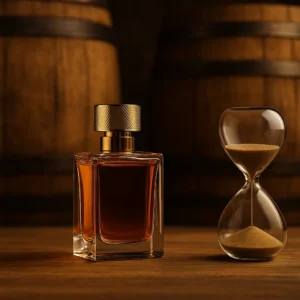
What Is Perfume Maceration?
Maceration is a biochemical process used to extract fragrant raw materials from natural sources such as plants and fruits. It relies on the activity of microorganisms like bacteria and yeasts to convert sugars into alcohol and aromatic compounds.
The Maceration Process
Preparing the Raw Materials
First, the plant materials intended for maceration—such as flowers or fruits—are cleaned, cut, and placed in special containers. Essential liquids like water and sugar are then added to create an ideal environment for yeast and bacteria to thrive.
Blending Essential Oils with Alcohol
Concentrated essential oils are mixed with pure alcohol, which serves both as a solvent and a carrier for the fragrance. This step requires precise measurements to achieve the desired concentration. At this stage, the mixture is sharp and dominated by an alcoholic scent before the maceration process begins.
Sealing and Storing the Mixture
The blend is transferred into dark, airtight glass bottles, stored in a cool and dry place away from light and heat to prevent deterioration. This environment allows the aromatic molecules to slowly interact and stabilize.
Periodic Agitation
During maceration, the bottles should be gently shaken every few days. This helps redistribute the oils evenly, ensuring consistent interaction with the alcohol. Gentle agitation accelerates the blending process, improving the quality of the fragrance and allowing it to reach peak clarity more quickly.
Filtering the Perfume
Once the maceration period is complete, the perfume is carefully filtered to remove any impurities or solid residues, leaving behind a clear and refined liquid. This preparation step ensures the fragrance is ready for bottling in its purest form.
Final Quality Check
Before bottling, the perfume undergoes a thorough quality assessment. The scent, longevity, and clarity are all tested to confirm that the fragrance meets the required standards. This final inspection guarantees that the product is ready for use at the highest level of quality.
Also read: Aging Composite Perfumes for Longevity & Fragrance (Full Guide)
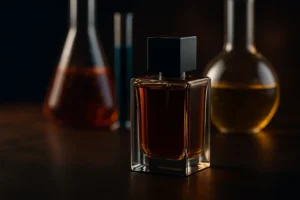
Natural Vs. Industrial Maceration
Process Duration
Natural maceration takes longer because it relies on the slow biological activity of naturally occurring microorganisms. This extended process gives the fragrance more depth and stability. Industrial maceration, on the other hand, is much faster, enabling large-scale production within a shorter time frame.
Quality of Ingredients
In natural maceration, the ingredients are 100% organic, resulting in a rich and authentic scent profile. Industrial maceration may use either natural or synthetic ingredients, producing a fragrance with a consistent and predictable aroma.
Impact on Quality
Natural maceration adds a unique depth and evolving character to the fragrance, enhancing its overall quality. Industrial maceration ensures uniformity and consistency, delivering a scent that remains identical across different production batches.
Production Cost
Natural maceration is more costly, as it relies on organic raw materials and requires a longer processing time. Industrial maceration is more economical, using synthetic inputs that allow for mass production at lower costs.
To guarantee the finest results, partner with a manufacturer skilled in both maceration and aging. At Jasmine, we offer naturally macerated raw materials that empower you to craft distinctive, captivating fragrances.
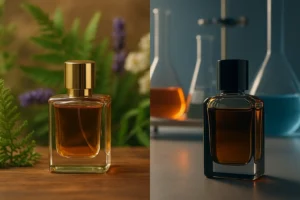
Perfume Aging Vs. Perfume Maceration
Though often mentioned together, aging and maceration are two entirely different processes, each serving a distinct role in perfumery. Here are the key differences:
- Duration: Aging requires several weeks to months, allowing the essential oils to interact and mature naturally. Maceration is faster, with the blend soaked in alcohol for just a few days to weeks to stabilize the scent.
- Method: In aging, the oils are left to interact on their own in a controlled environment, achieving harmony and balance between the components. Maceration, however, involves soaking the oils in alcohol to accelerate their fusion and improve fixation.
- Result: Aging imparts a deep, well-rounded aroma ideal for fine, luxury perfumes. Maceration, on the other hand, provides quicker stability, making it suitable for large-scale production and everyday fragrances.
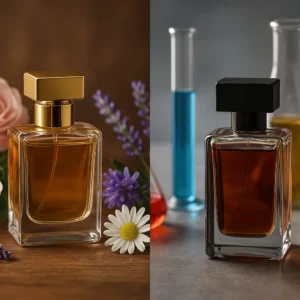
When Should a Perfumer Choose Aging vs. Maceration?
Here are the scenarios where each process is applied:
Aging
Used in the final stages of perfume production, especially for luxury and natural fragrances. Aging ensures that the perfume achieves its best performance in terms of depth and longevity. Perfumers turn to aging to soften the alcoholic sharpness, fuse the ingredients into harmony, and deliver a truly distinctive scent.
Maceration
Unlike aging, maceration takes place at the very beginning of the process, when creating raw aromatic materials. Perfumers may choose natural maceration to obtain complex, organic aromas, or industrial maceration to produce consistent scents in large volumes that meet commercial production demands.
Understanding these different stages of perfume making gives you a strong competitive edge in the market. Connect with our team today—partnering with us will empower you to craft unique fragrances tailored to your clients’ needs.
Also read: Aging Composite Perfumes for Longevity & Fragrance (Full Guide)
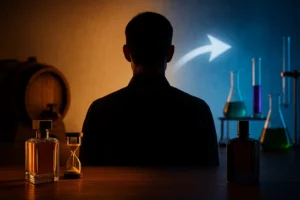
Jasmine: The Leading Manufacturer of Turkish Perfumes and Fragranced Products
Jasmine is a distinguished name in the world of Turkish perfumery, where authentic Turkish heritage meets world-class quality. With us, you can build your brand with confidence, offering products that truly resonate with your customers.
- Expertise in Fragrance Compositions: Our extensive experience in perfume formulations allows us to craft distinctive and memorable scents.
- Natural and Organic Raw Materials: We source only the finest essential oils and natural, organic ingredients.
- Production to the Highest Standards: Every stage of our process follows strict quality protocols, ensuring products that are both safe and effective.
- Advanced Manufacturing Technology: By integrating modern technologies, we guarantee efficiency, precision, and innovation, giving your products a competitive edge.
- Flexible OEM Manufacturing: We offer private-label and custom manufacturing services, helping you develop products that reflect the unique identity of your brand.
- Reliable Supply Chain: We maintain a stable and trusted supply of high-quality raw materials, supported by dependable suppliers, to secure consistency for your business.
Start building your fragrance brand with confidence. Partner with Jasmine, and let our expertise and commitment to excellence ensure your success in the competitive perfume market.
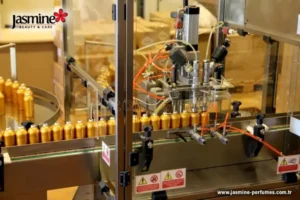
FAQs About Aging Vs. Maceration in Perfumes
Is maceration necessary for perfume?
Not necessarily. However, aging improves the quality of perfumes containing natural oils, allowing the components to integrate fully and giving the fragrance greater depth and lasting power.
How long does the maceration process take?
The maceration process, used to produce raw aromatic materials, takes anywhere from a few days to several weeks, depending on the type of ingredients.
How long should a perfume be aged?
The aging period varies according to the composition. It can range from one month to several months. Perfumes with heavier ingredients such as oud and musk require a longer aging time.
What is the best way to age a perfume?
The optimal method is to store the perfume in a cool, dark place away from light and heat, preventing ingredient degradation. Gently shaking the bottle every few days helps accelerate the blending process.